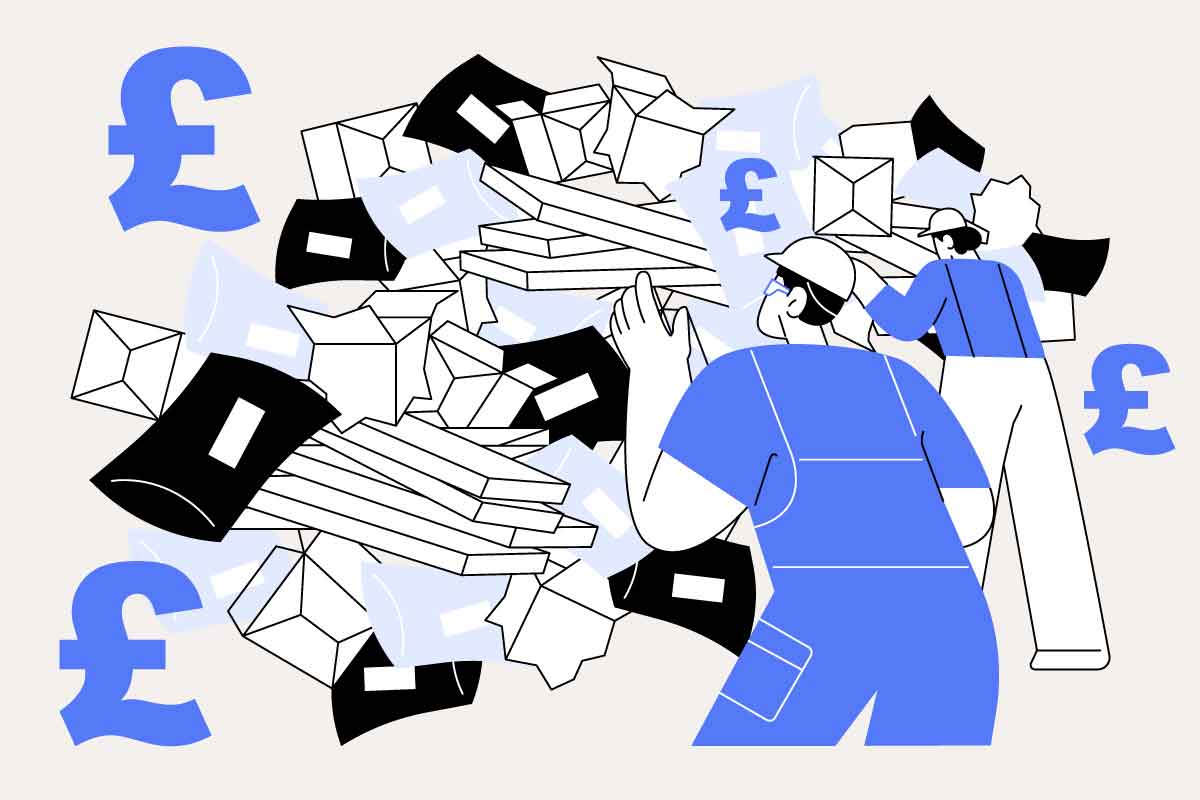Understanding the nuances of commercial waste collection costs is vital for UK businesses, particularly as they adapt to the economic landscape of 2025.
This guide aims to provide an in-depth look into the expenditures that businesses need to consider and how these can be effectively managed.
Waste collection costs for UK business
The starting point for commercial waste costs is around £300 per year, incorporating bin hire, landfill taxes, and administrative fees. However, this figure is a mere baseline with actual costs varying significantly based on several critical factors.
Table 1: Annual bin hire costs
| Bin Size (Litres) | Annual Cost (£) |
|---|---|
| 240 | £40 – 70 |
| 660 | £60 – 110 |
| 1100 | £100 – 140 |
Table 2: Landfill tax and admin fees
| Cost Type | Amount (£) |
|---|---|
| Landfill Tax | £102.10 per tonne |
| Gate Fee | £6 per tonne |
| Congestion Charge (where applicable) | £15 per occurrence |
| Waste Transfer License – High Tier | £154 (one-off) |
Table 3: Estimated annual waste collection costs
| Business Location | Small Business (£) | Medium Business (£) | Large Business (£) |
|---|---|---|---|
| Urban | £500 – 1000 | £1000 – 3000 | £3000 – 7000 |
| Suburban | £300 – 800 | £800 – 2500 | £2500 – 6000 |
| Rural | £300 – 700 | £700 – 2000 | £2000 – 5000 |
Factors influencing waste disposal costs and prices
The costs associated with commercial waste collection are multifaceted, often varying widely from one business to another. Here’s an expanded look at the key factors that influence these costs:
Type of waste
The composition of a business’s waste can significantly alter the price of disposal. Hazardous materials, such as chemicals or medical waste, require strict handling and disposal processes, leading to higher costs. Conversely, recyclable materials like paper, plastics, and metals can often be disposed of or even recycled at a lower cost due to the value they can retain in the recycling market.
Location of the business
The geographical location of a company is a decisive factor in determining waste collection costs. Businesses situated in urban areas, particularly in city centres, usually face higher fees due to factors like congestion charges, parking restrictions, and the Ultra Low Emission Zone (ULEZ) charges. Conversely, businesses in rural areas may encounter higher transport costs due to the distance waste must be transported to disposal or recycling centres.
Amount of waste
The volume and weight of the waste generated by a business directly influence collection costs. Larger and heavier bins cost more to hire and collect, and the frequency of collections needed can add to the overall cost. Furthermore, the size of the bin required and the frequency of collection services will vary depending on the rate at which a business produces waste.
Regulatory factors
Environmental regulations and taxes, such as the landfill tax, are designed to encourage waste minimisation and recycling. These taxes are subject to change and can have a substantial impact on the overall cost of waste disposal.
Additional services
Costs can also be affected by the level of service required. Businesses may need additional services such as confidential waste disposal, food waste collection, or on-site waste compaction, all of which can increase the total cost.
Cost breakdown – Business waste collection and disposal
The total cost of commercial waste collection comprises several components, each contributing to the overall fee that a business will incur. Here’s a list of the typical components:
| Component | Cost Range/Figure |
|---|---|
| Bin Hire | £40 – £140 annually |
| Collection Fees | Variable (quote-based) |
| Landfill Tax | £102.10 per tonne |
| Waste Transfer Costs | ~£6 per tonne (gate fees) |
| Administration Fees | Variable; £154 for high-tier waste transfer licence |
| Licensing Fees | Free for low-tier; £154 for high-tier |
| Congestion Charges | £15 per day in charge zones |
| Environmental Compliance Fees | Variable (compliance-specific) |
| Recycling Costs | Lower than general waste (material-specific) |
| Special Waste Handling Fees | Higher than non-hazardous waste (hazard-specific) |
Streamlining costs with waste management services
Many waste management companies offer services that bundle these costs into a single, streamlined fee. This can not only simplify budgeting but may also lead to cost savings. It’s recommended that businesses explore different suppliers to find the most cost-effective solution.
FAQ for commercial waste collection costs
The average cost starts from around £300 per year, which typically includes bin hire, landfill tax, and administrative fees.
Hazardous waste usually costs more to dispose of due to the need for specialised handling and disposal methods, compared to recyclable materials like paper, glass, and cardboard.
Businesses in urban areas, especially central London, may incur higher fees due to congestion charges and stricter emissions regulations.
You can reduce costs by minimising waste, recycling more, negotiating better rates with waste collection agencies, or by using a waste comparison tool to find the most cost-effective service.
Yes, you may need to account for gate fees, waste transfer licence fees, and congestion charges, depending on your business location and the waste management company you choose.
Commercial waste collection typically costs between £5 and £30 per bin collection, depending on the bin size, frequency, and waste type. Weekly general waste collections for a 240-litre bin may cost around £10–£15, with larger bins (1,100 litres) costing £25–£30 per lift.
Costs depend on several variables: waste type, volume, collection frequency, location, and whether recycling or hazardous waste is involved. Businesses in remote or urban centres may pay different rates due to travel and handling costs.
Yes. Hazardous and clinical waste services usually include higher charges due to legal handling and disposal requirements. Expect to pay £40–£150+ per pickup depending on the material, licensing, and containers involved.
Yes. Recycling collections are often cheaper than general waste, and in some cases, providers may offer discounts or free recycling collections as part of bundled services.
Usually, yes. Some providers charge a rental or purchase fee for bins, typically £1–£10 per week, depending on the size and type. Some providers may include bin hire in the overall contract.
Collection can be scheduled daily, weekly, or fortnightly, with more frequent pickups costing more. Businesses generating high waste volumes may require multiple lifts per week, which increases the total cost.
Most providers offer contracts ranging from 12 to 36 months, though monthly rolling contracts are also available. Longer terms may offer better rates, but reduced flexibility.
Yes. Pricing is often negotiable, especially for multi-site businesses or those requiring regular high-volume collections. It’s also worth comparing quotes across multiple providers for the best deal.
Many waste companies offer flexible services that can be scaled up during peak times. However, extra lifts or larger bins will usually incur additional charges.
While there’s no direct subsidy, reducing landfill waste and improving recycling can lower your costs. Some local councils or waste partnerships may offer free audits or advice on waste reduction and compliance.

